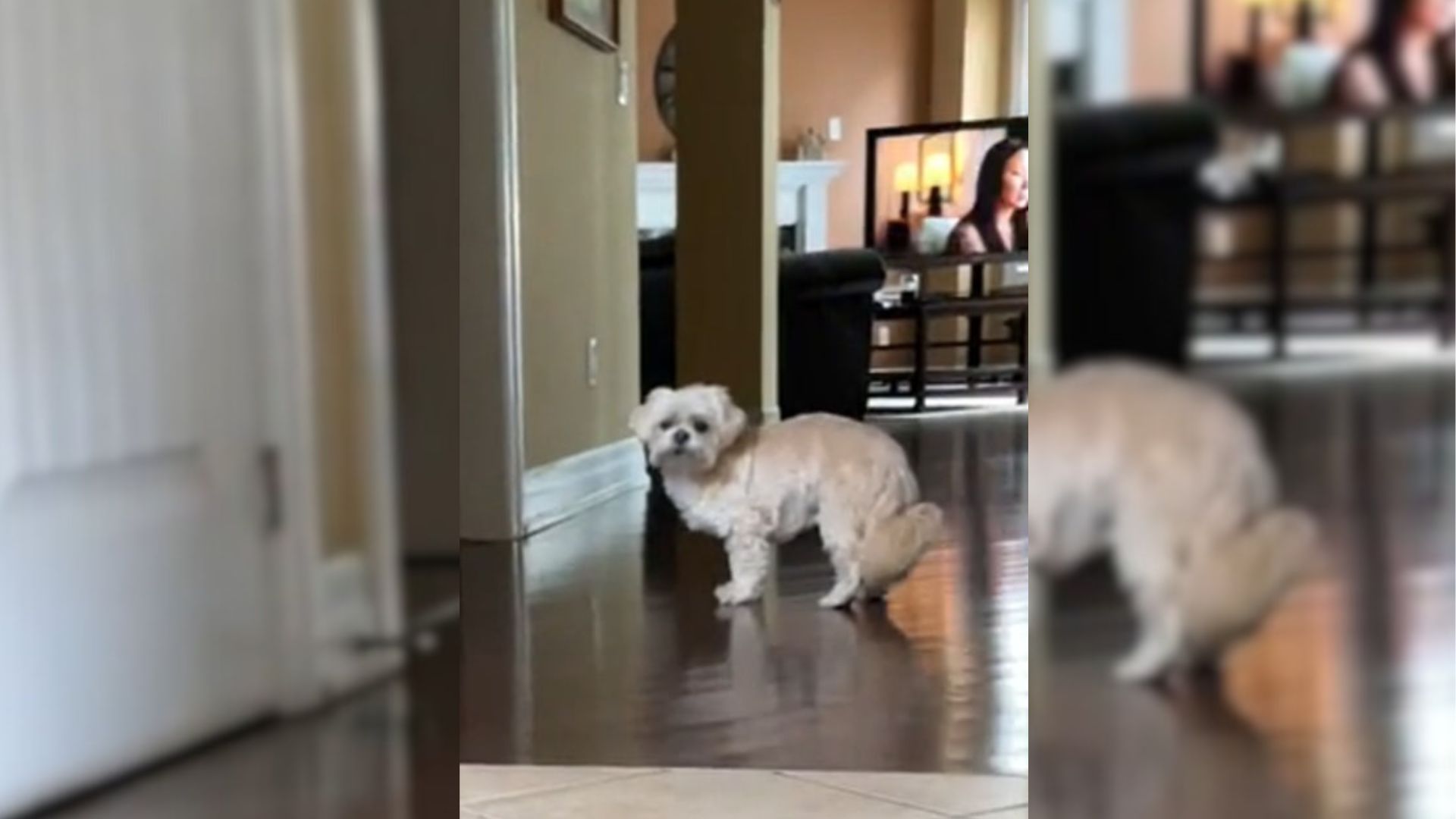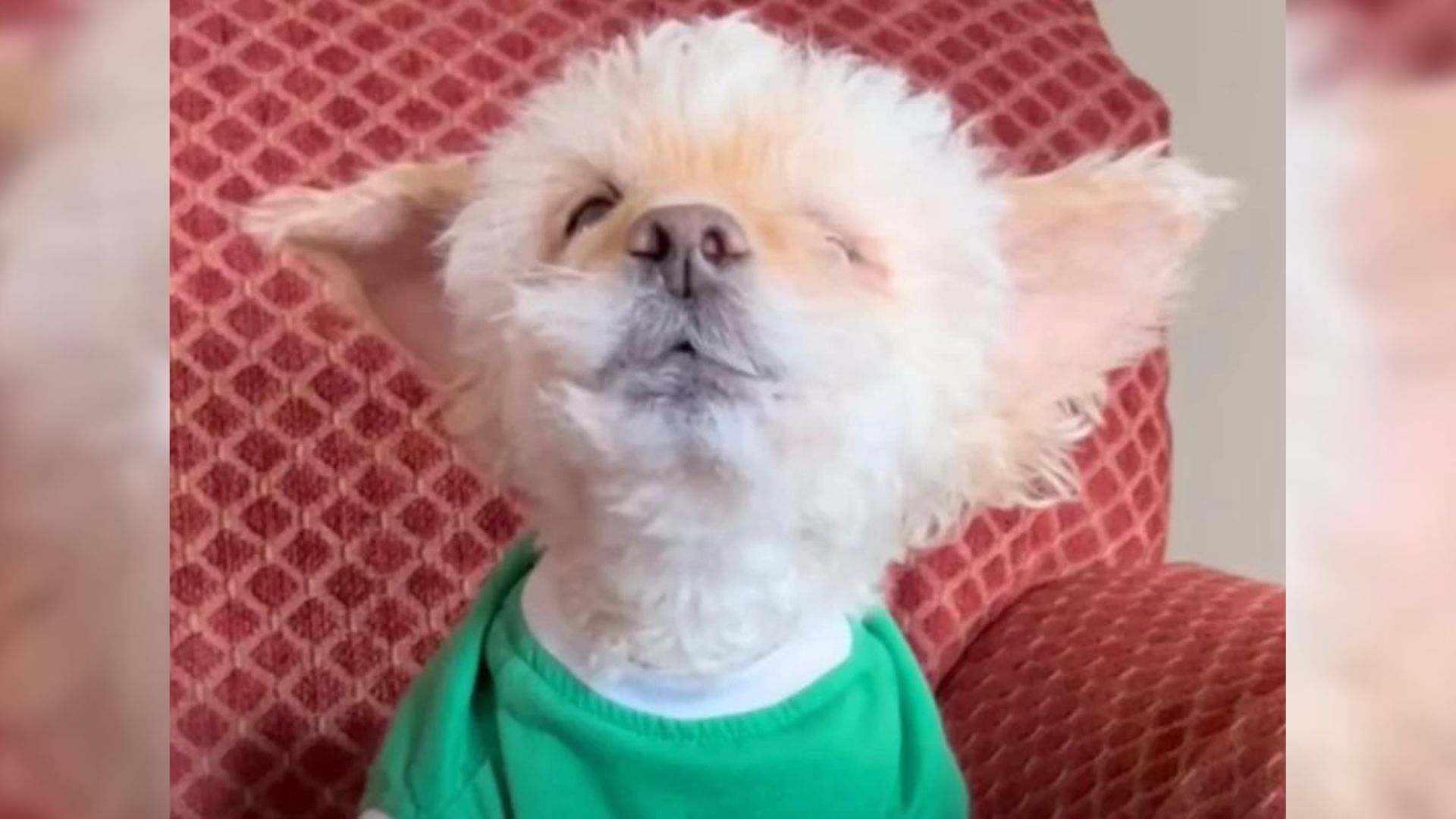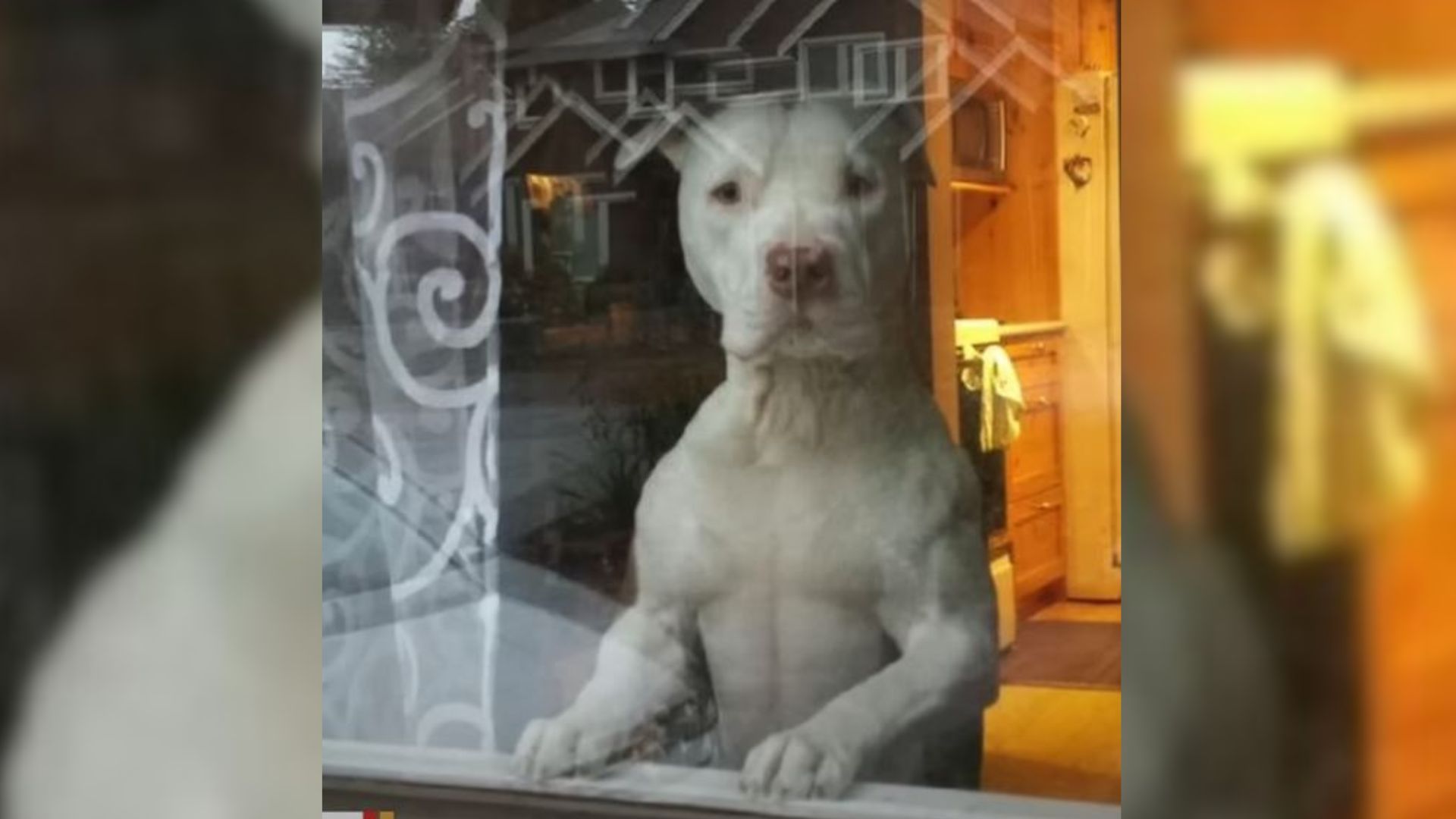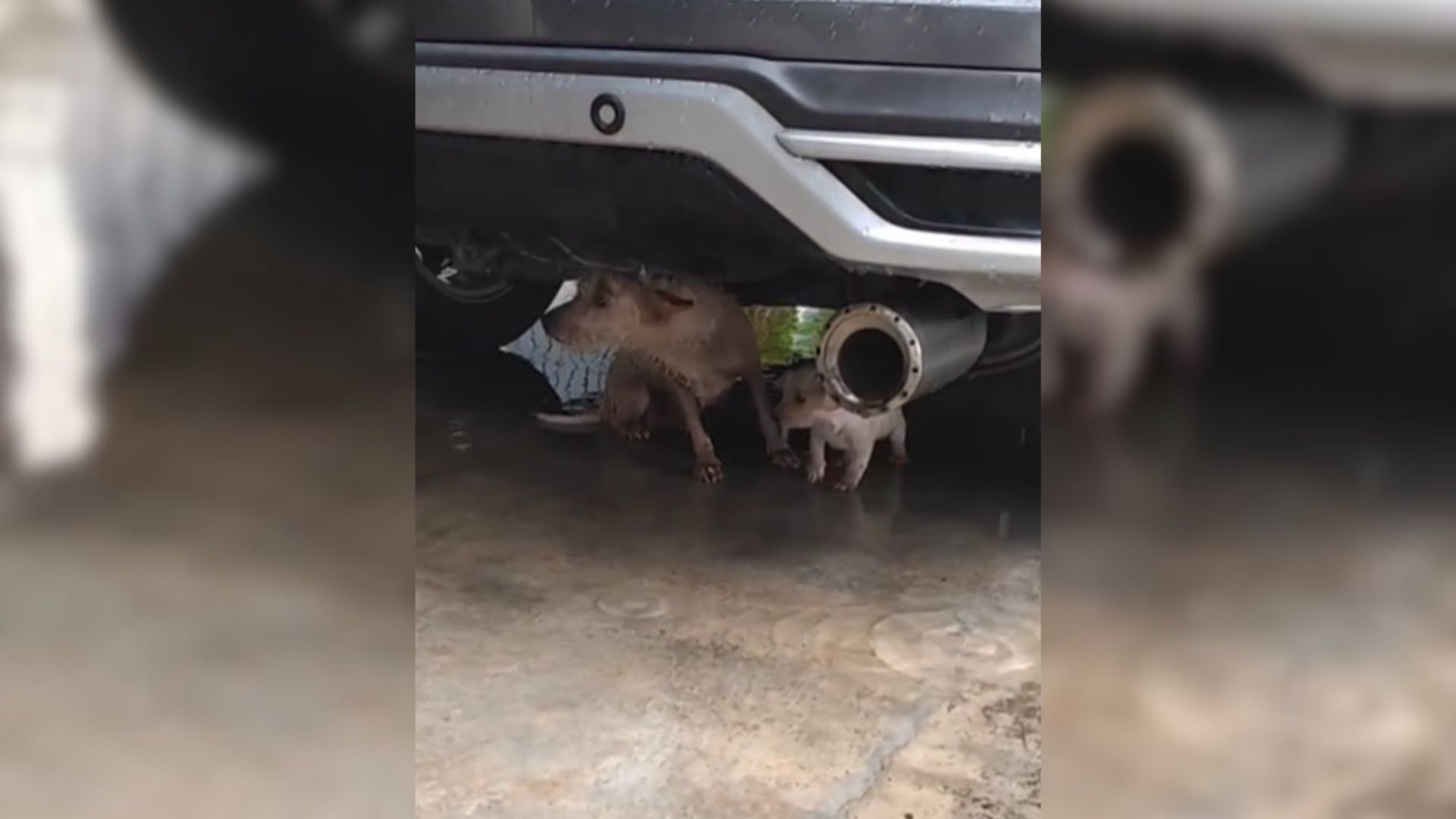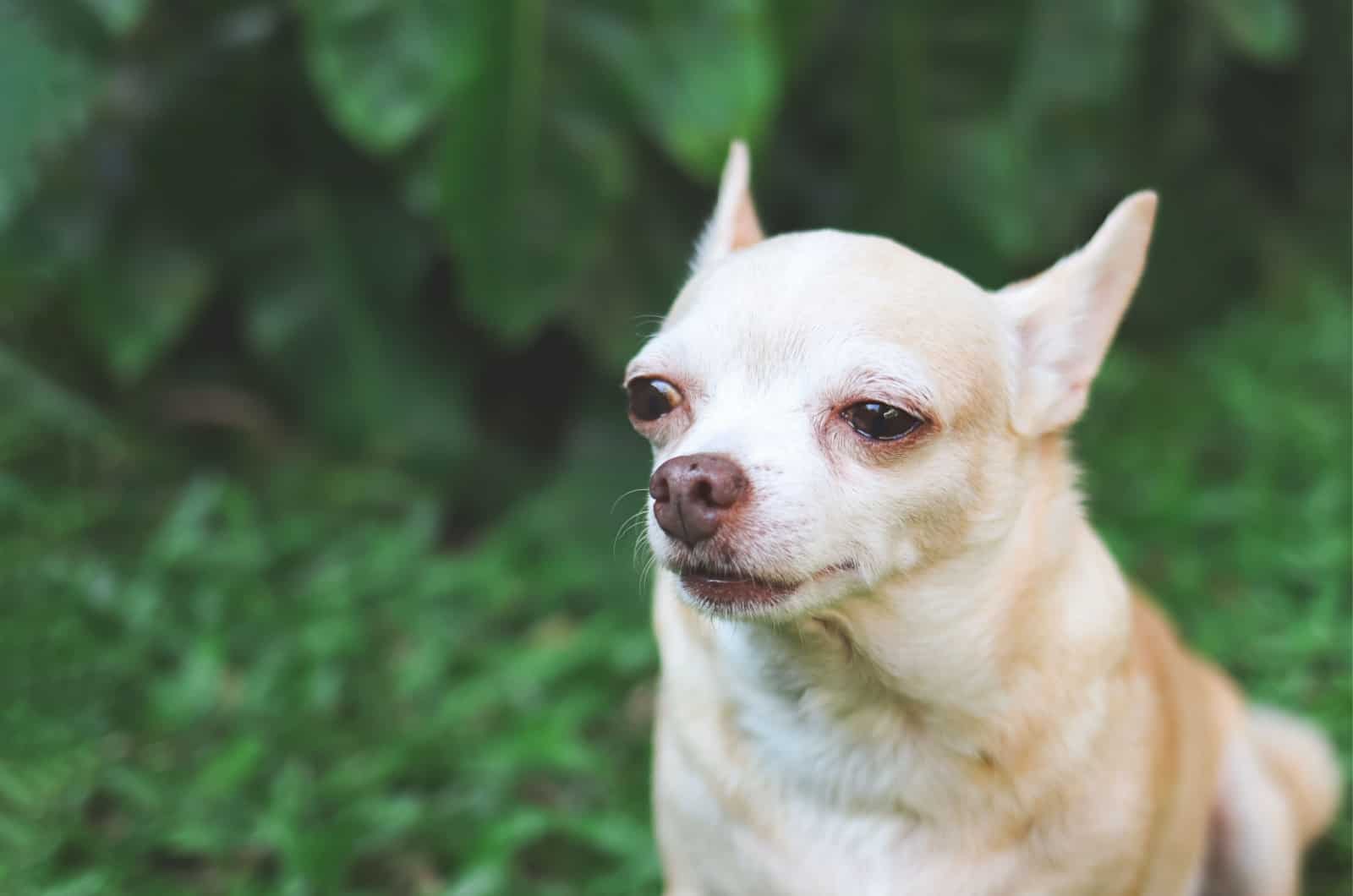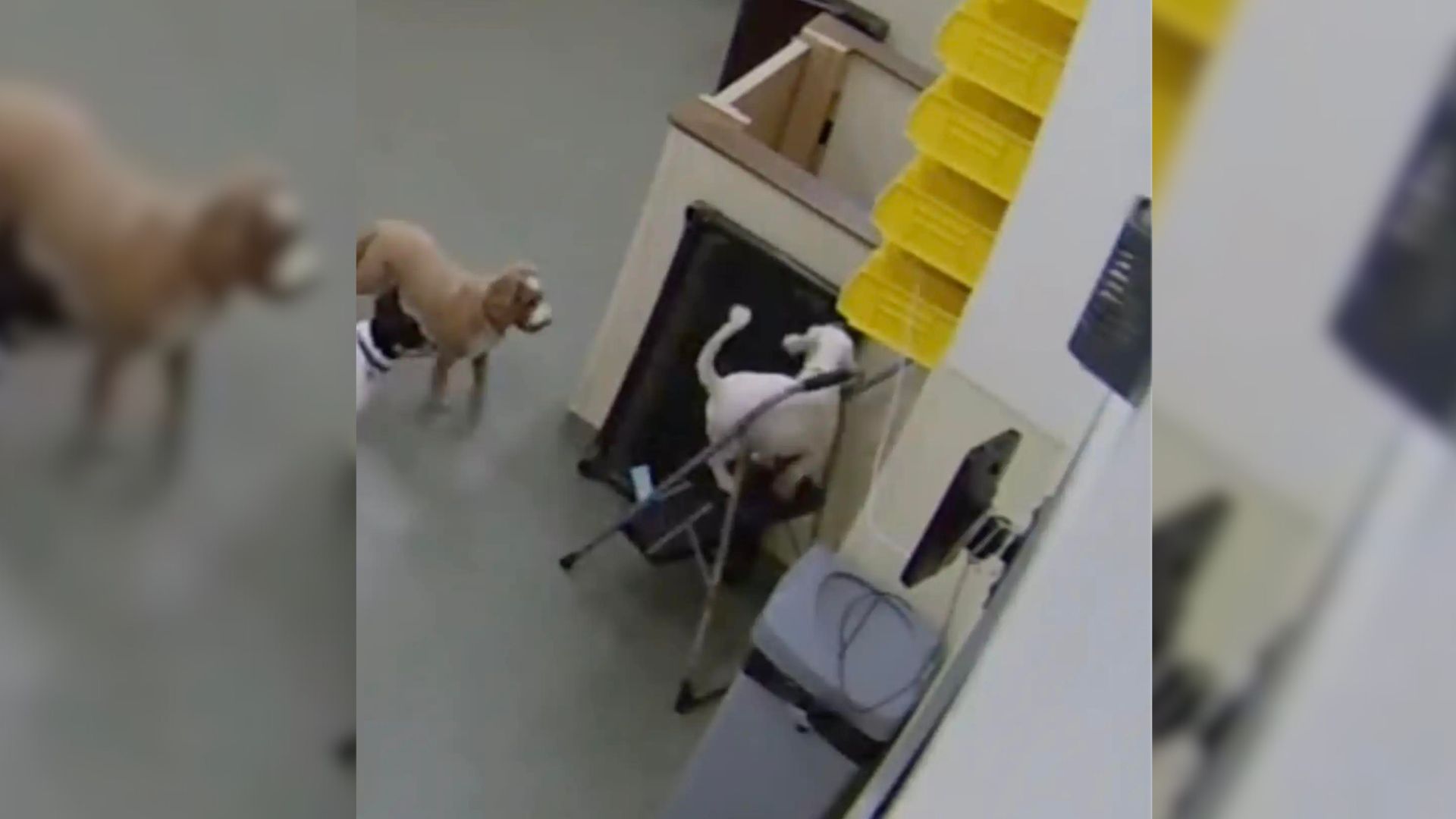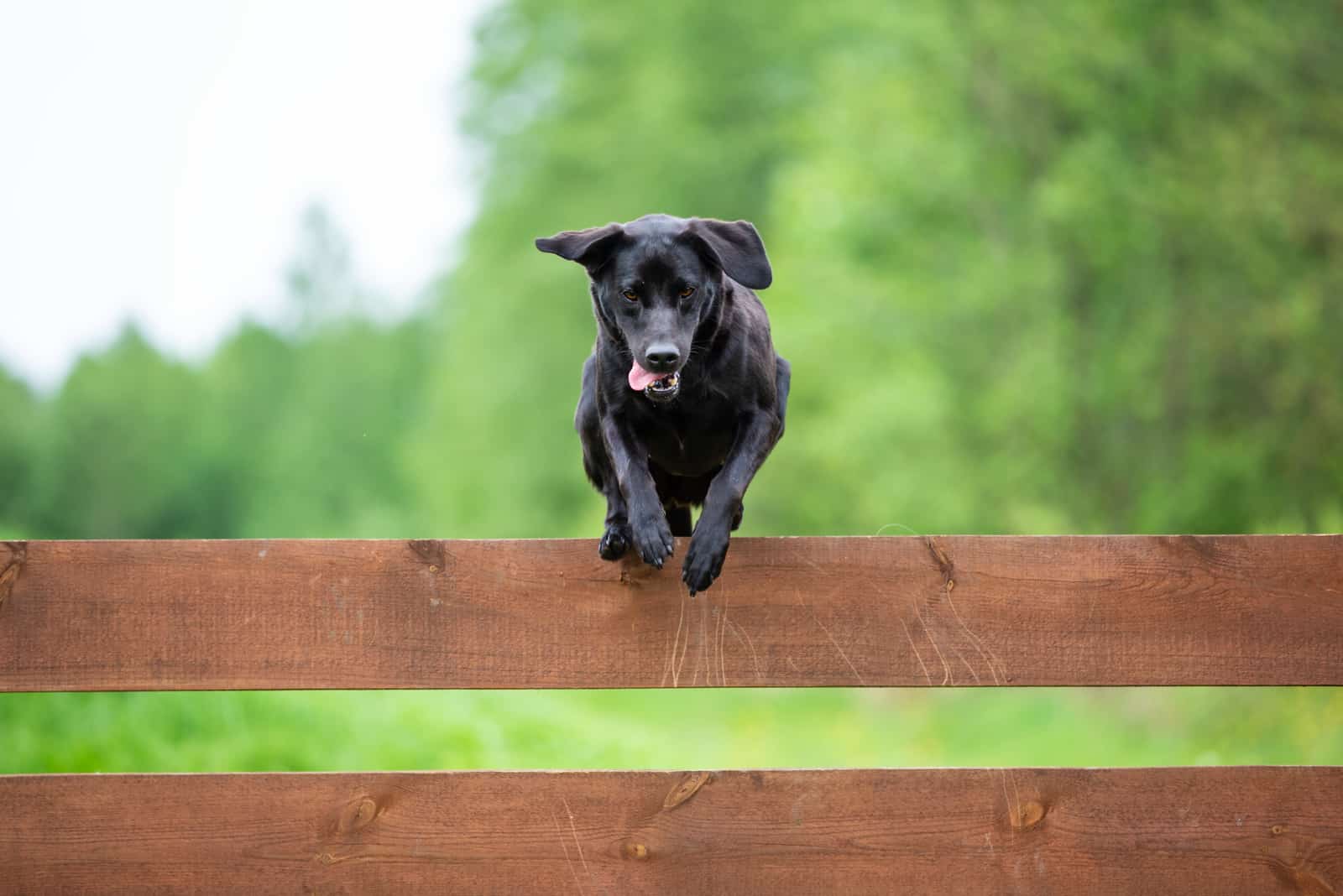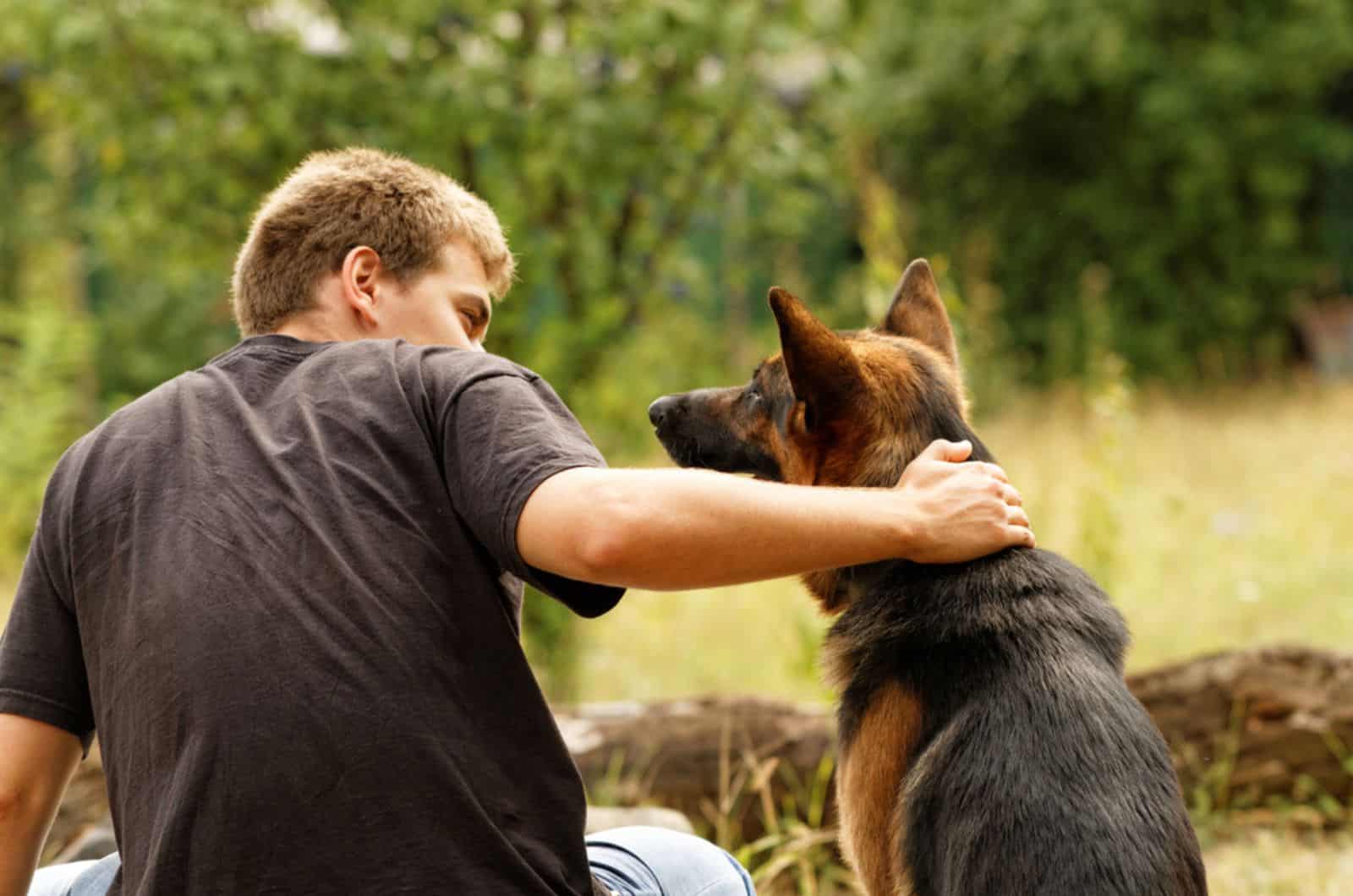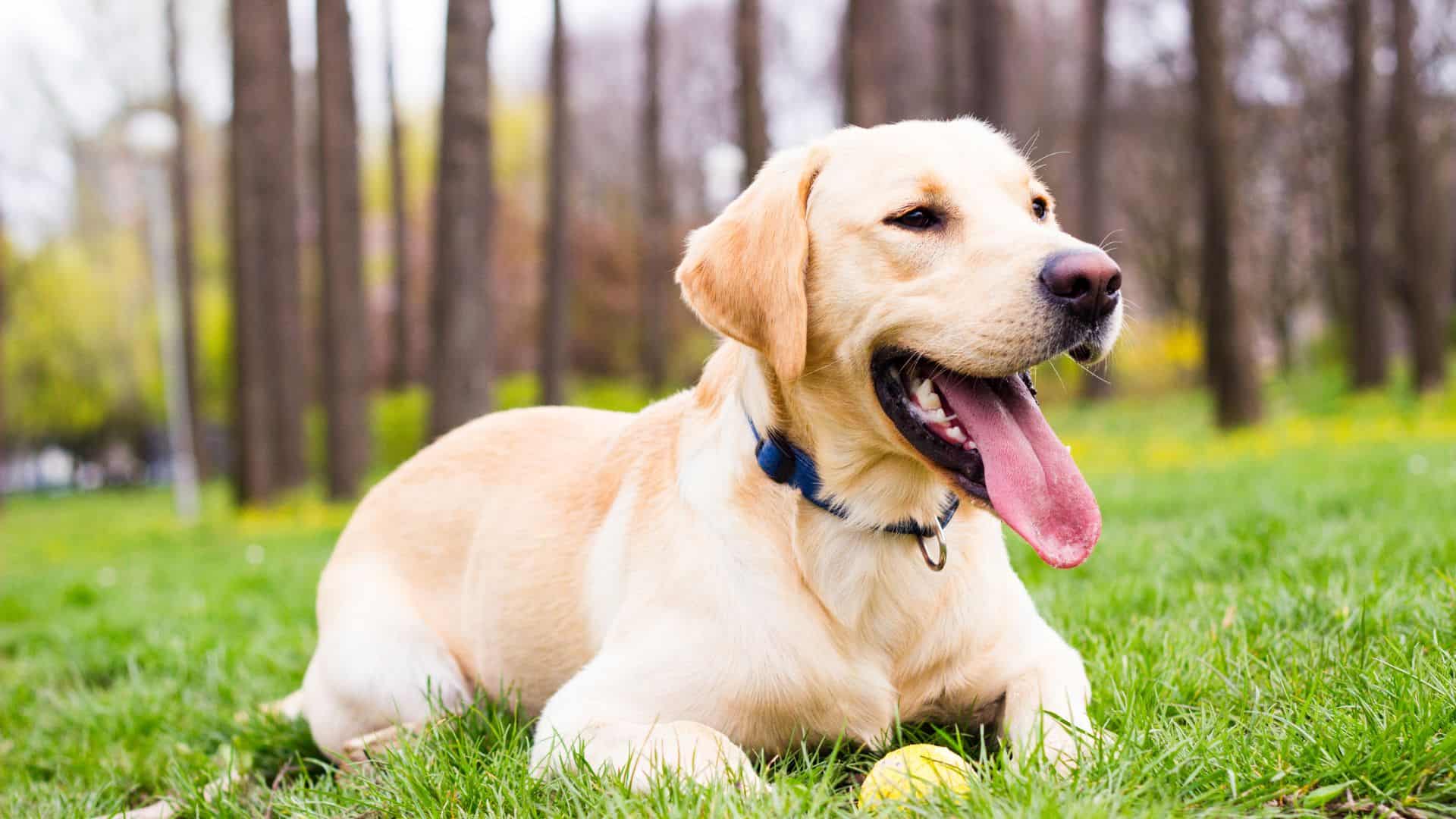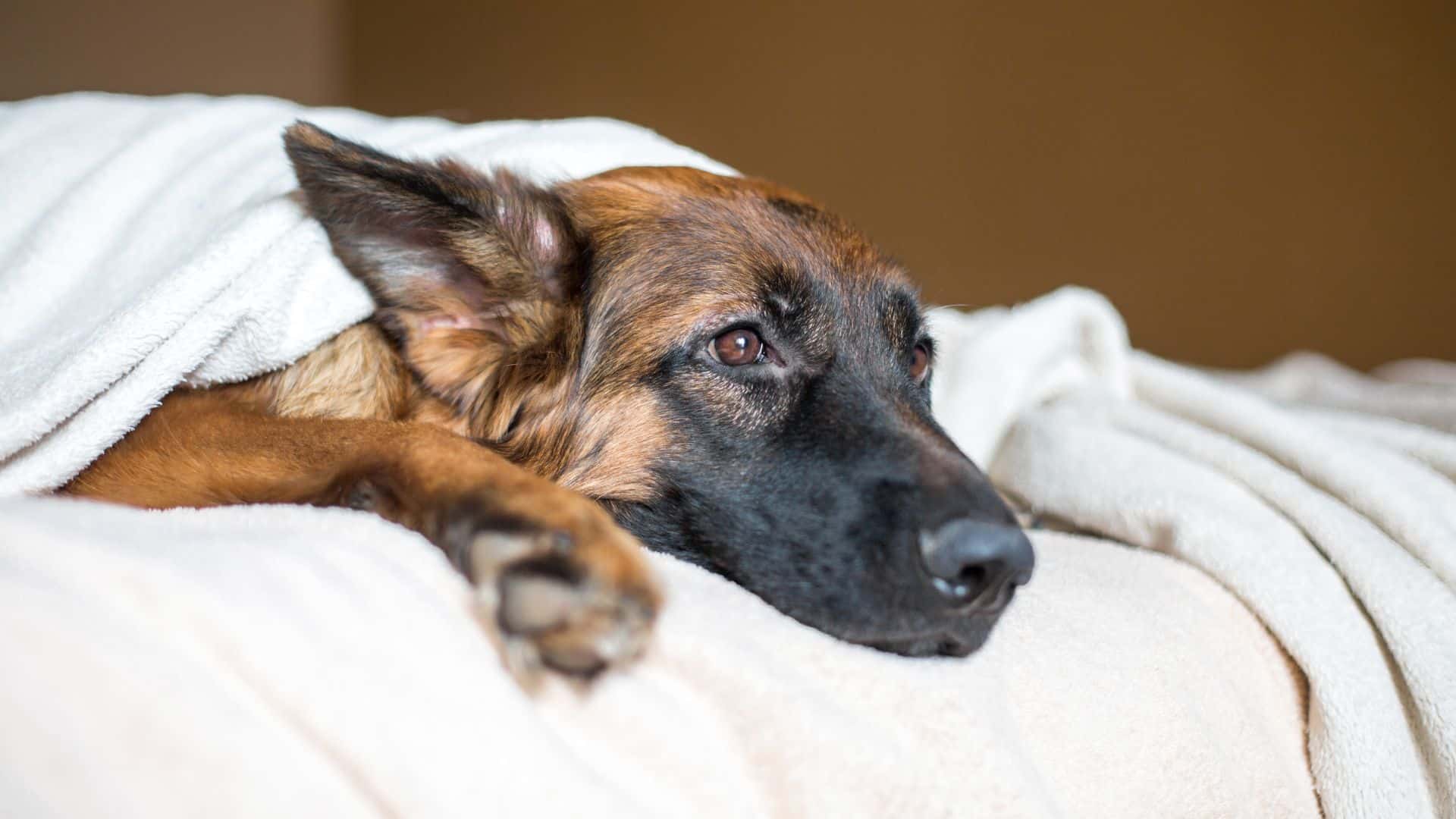At times, the ‘‘Why does my Pitbull sleep so much’’ dilemma can be exhausting for first-time, new owners. This is because Pitbull puppies are considered to be high-maintenance dogs that are sometimes hard to figure out.
Keeping up with the plethora of emotions they have is, at times, a full-time job.
However, in order to understand what makes an average Pit dog tick, you need to start with its daily routine first. After careful consideration of this large breed’s needs, you will get a clearer picture of how these muscular beauties function.
Aside from eating and exercising, sleeping is one of the three most crucial parts of their daily routine. Still, a respectable Pit owner should know the line between normal sleep and too much sleep. So, let’s solve this dilemma!
Why Does My Pitbull Sleep So Much
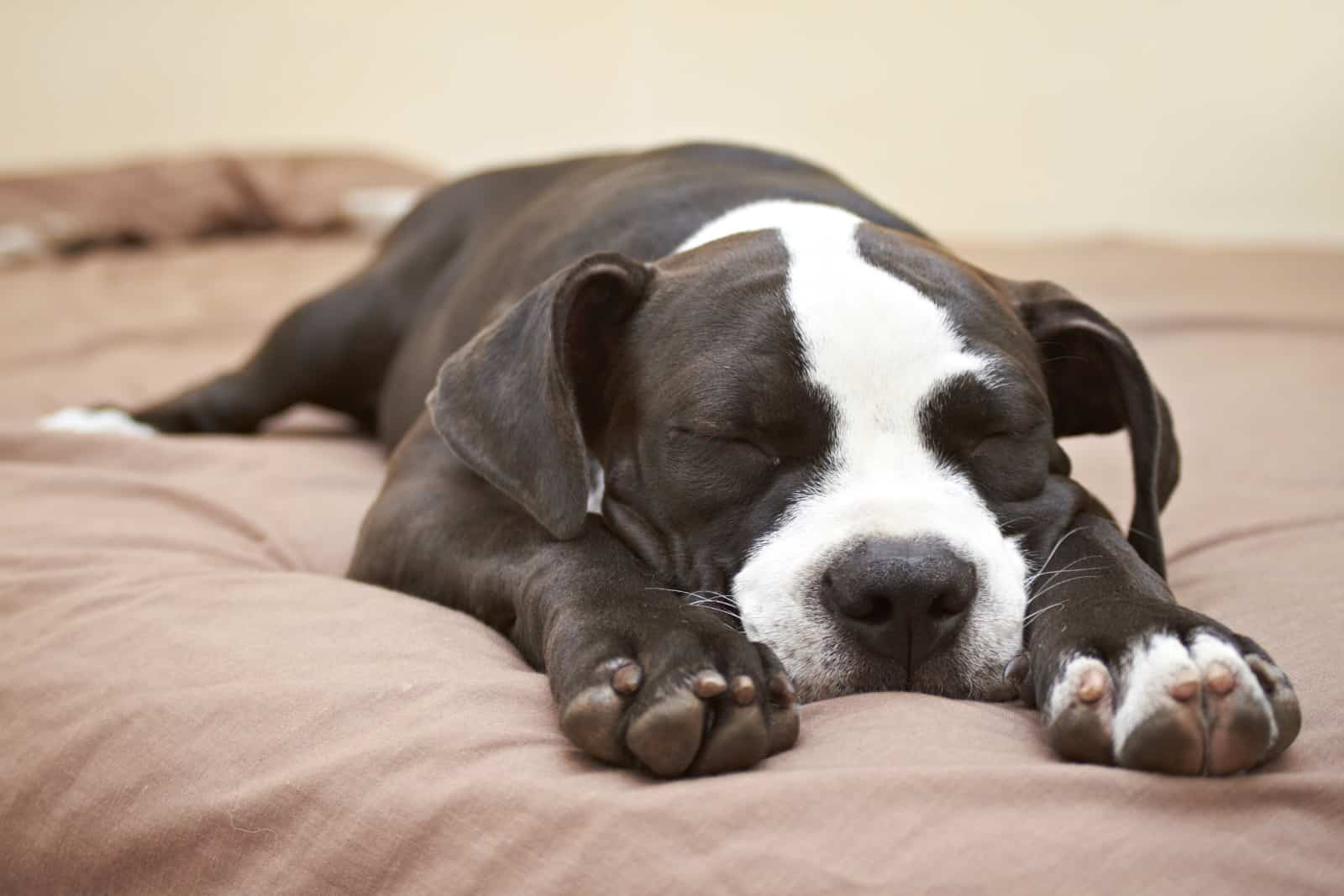
Decoding the ‘‘Why does my Pitbull sleep so much’’ dilemma is not always easy. This is because excessive sleeping can be triggered by a plethora of physical and mental conditions.
On the other hand, too much sleeping doesn’t necessarily have to be a bad thing as some dogs spend hours of sleep just to renew burned energy from high-intensity training, or a long walk.
Generally, a well-bred Pitbull is considered to be an active dog that demands a lot of exercise during the day. Still, these canines need a respectable time to rest as they usually spend a lot more energy during the day than some other dog breeds.
Still, if you’re worried that your Pit companion has entered a state of lethargy, or some sort of routine imbalance out of nowhere – you can start looking for a cause in these nine possible answers.
1. Early Puppyhood
It is not uncommon for young Pit puppies to sleep a lot more than adult Pitbulls. This especially refers to puppies during their early puppyhood, which is considered to be the first eight weeks of their life.
The ‘‘why do Pitbulls sleep so much’’ during their puppyhood age can be explained by the fact that they require extra sleep in order to grow properly.
Night and day sleeping helps puppies better develop their nervous system, immune system, strong body physique, and even their brain.
By the time you notice the first teething symptoms in your puppy, your Pit is most likely to be sleeping even up to twenty hours a day. As the time goes by, the number of sleeping hours will reduce down to between 14 and 15, which is still perfectly fine.
However, if you notice that your Pit puppy is acting strange alongside excessive sleeping – you should seek help from your veterinarian.
2. Lethargy
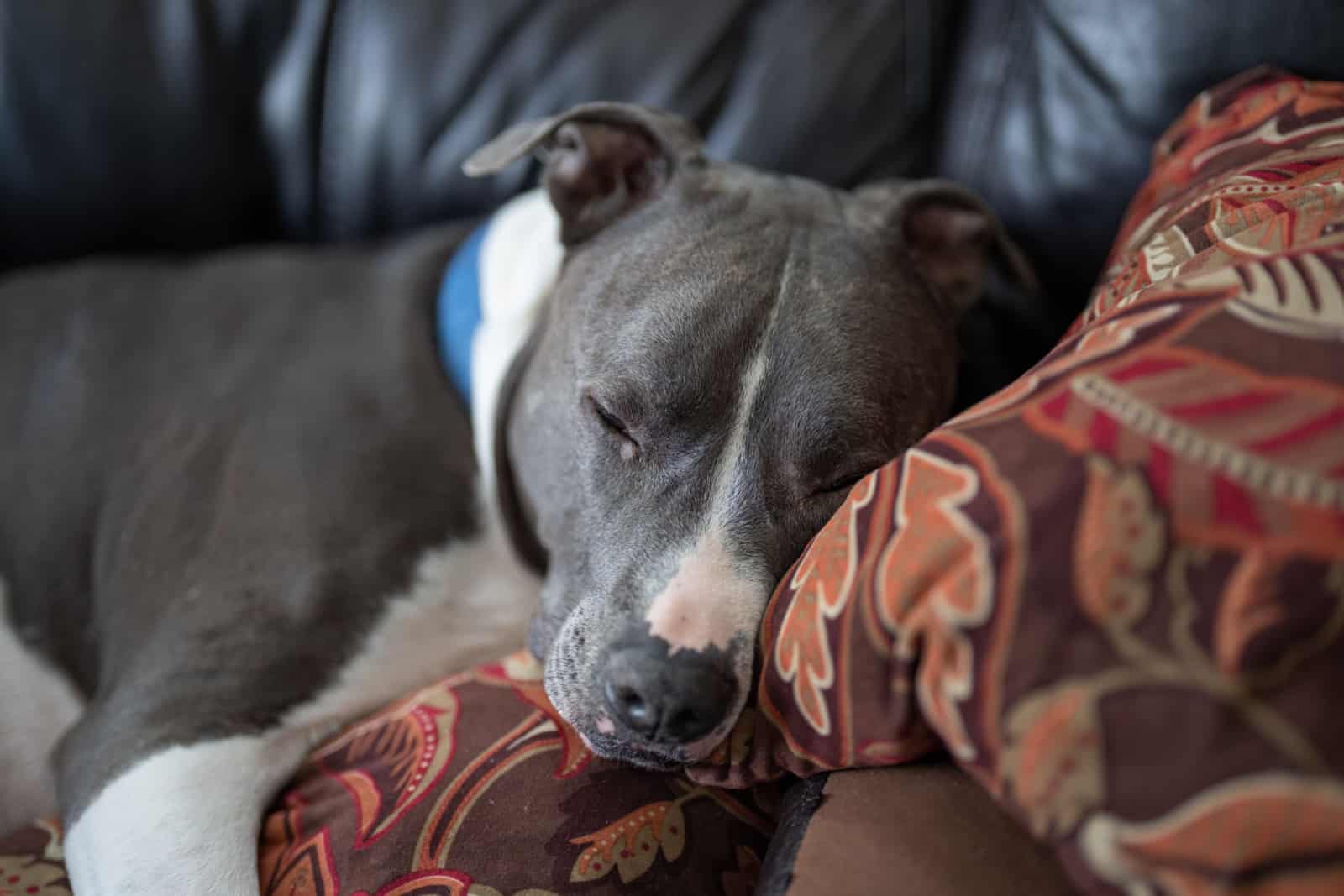
Lethargy is never normal for dogs to be affected with. On the contrary, Pit canines are always eager to play with their owner as they are considered to be quite active.
There is more than one trigger for lethargy, though. Most of the time, Pit canines are lethargic due to some medical conditions, such as hip dysplasia and bloat.
Furthermore, lethargy can be triggered by severe stress or depression, which is why you need to dig deeper and find the cause of such behavior.
Lethargic behavior is symptomized throughout weight gain, loss of appetite, excessive sleeping, avoiding playtime, and refusing to perform normal canine activities.
Sometimes, it is hard for pet owners to recognize the signs of lethargy as this behavioral pattern is usually similar to general laziness.
Preventing or curing lethargy in a dog is not an easy process as it may require a veterinarian or a professional dog behaviorist’s assistance, especially if you are a first-time dog owner.
Still, if you don’t seem to be having any progress in your work, seeking professional help is not the worst thing that you can do.
3. Stress And Anxiety
Have you noticed that your Pit has become clingy lately? Well, the reason for this behavioral pattern can certainly be found either in stress or in anxiety.
Pit puppies are an extremely affectionate and dependent dog breed, which is why they require committed owners with a flexible schedule.
It is not uncommon for Pits to suffer from severe separation anxiety, especially if they are used to being with their owner 24/7 during puppyhood.
The ‘‘Why does my Pitbull sleep so much’’ phenomenon can be easily explained by the fact that some dogs respond to stress and anxiety by lethargic behavior, excessive sleeping, and general lack of will.
If your dog has unusual sleep cycles or refuses to have plenty of exercise during the day – revise its environment, routine, and social circle. Stress in dogs can be caused by simple boredom, high volume, frustration, and even restriction.
Instead of using harsh methods in your PIt’s training, try giving it as much positive reinforcement as possible. Pit canines that undergo too many restrictions may display undesirable behavioral outbursts and be self-destructive.
4. Depression
That’s right! Both male and female Pit canines can be depressed, especially if they went through a huge trauma such as loss of their owner, abuse, or long-term stress. These canines are extremely sensitive, which is why leaving them stressed is not the best option.
Most of the time, depression in Pits is triggered by a major trauma, such as injury. Injured dogs can become overly lazy, lethargic, and disinterested in any sort of activity, which, in the long run, results in depression.
Furthermore, the reason why some Pits feel depressed is because of a change of environment. If you have just moved to another house – there’s a possibility that your dog is gonna need some extra time to adapt.
Forcing a Pit puppy to do anything out of its daily routine can lead to depression. That’s why these canines need a slow adaptation process, especially when it comes to moving.
In fact, the first time you pick up your Pit from a breeder can be traumatic, which is why it is recommended to prepare a low-volume, nurturing space for your future pet.
Giving your dog enough time to adapt to a new environment is the key to a mentally healthy dog in the future.
5. Laziness
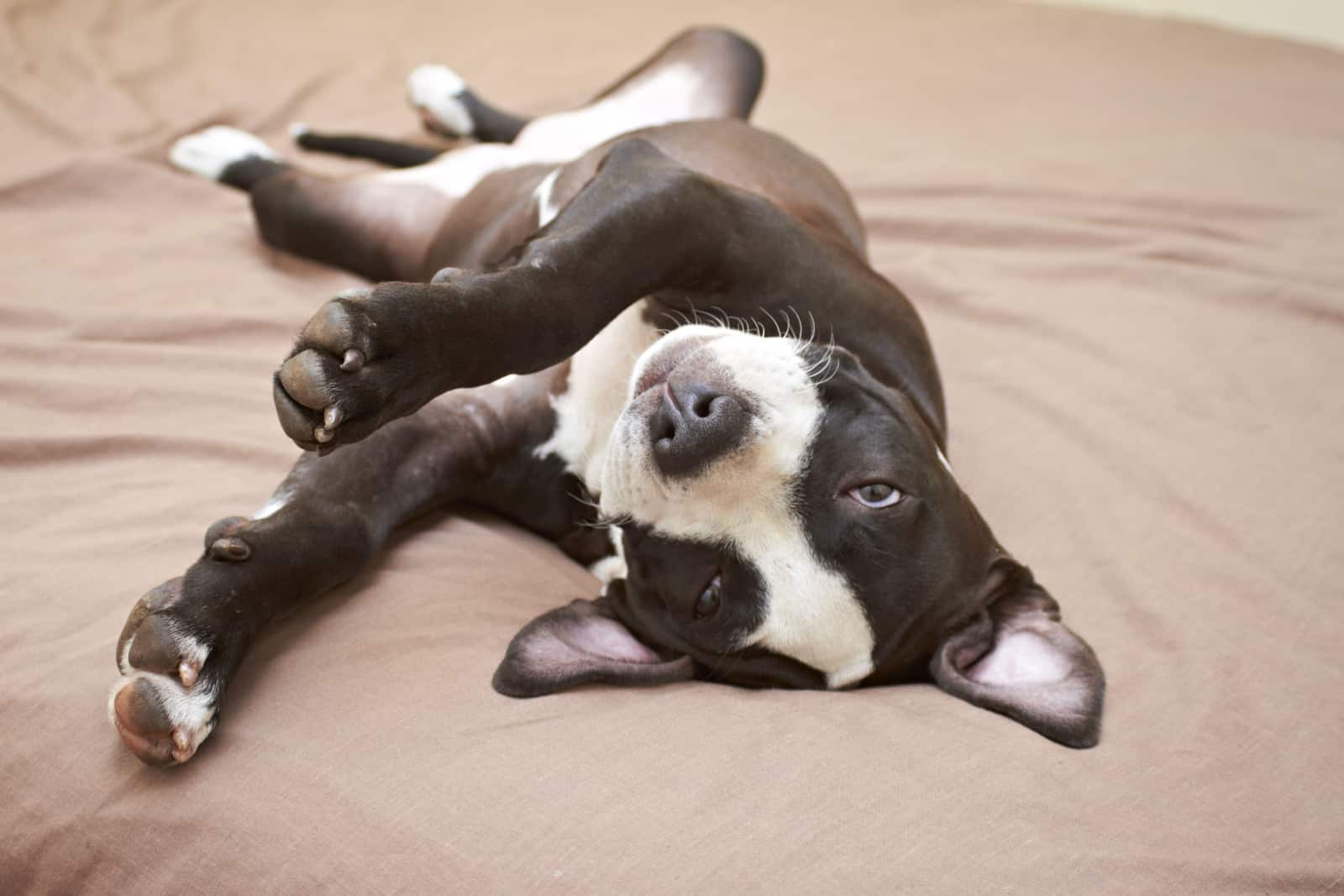
Sometimes, the answer to the ‘‘Why does my Pitbull sleep so much’’ question lies in the fact that your Pit is just lazy.
Even though these canines love spending time outdoors occupied, some Pit canines, due to their wrongly-prepared routine, sleep more than their well-routined counterparts.
Generally, adult dogs sleep less than puppies, which is why you need to make sure to boost activity in your dog as much as possible. Even though it is quite common for dogs to spend a big portion of the day sleeping, these canines need activity as well in order to remain healthy.
For starters, make sure you give it enough exercise during the day. These large canines need one to two hours of exercise on a daily basis. Anything less than that can result in laziness.
Consequently, laziness can affect the overall Pitbull growth chart, which is why some Pits are obese, lethargic, and unreliable in terms of their behavior.
6. Heart disease
Have you had a recent post-operative experience with your dog? If yes, then you know how slow of a process it is. During the recovery process, dogs are most likely to be lazy, lethargic, slow, and uninterested in any sort of activity.
Well, that’s the case with Pits with serious heart problems, too. Unfortunately, one of the major symptoms of heart disease in your dog is excessive sleeping.
Dogs that cope with heart issues are usually unable to stay active as much as healthy dogs, which is why they rather lay down, take naps, or sleep.
Naturally, these purebred beauties are prone to heart disease, which is why you need to make sure your puppy gets proper healthcare as well as a proper feeding routine.
Staying away from the poor-quality dog food brands, large portions of food, table scraps, and junk food is how you protect your dog from potential illness.
Other symptoms of heart disease that you need to pay attention to are coughing, panting, fainting, collapsing, and lacking appetite.
7. Other health problems
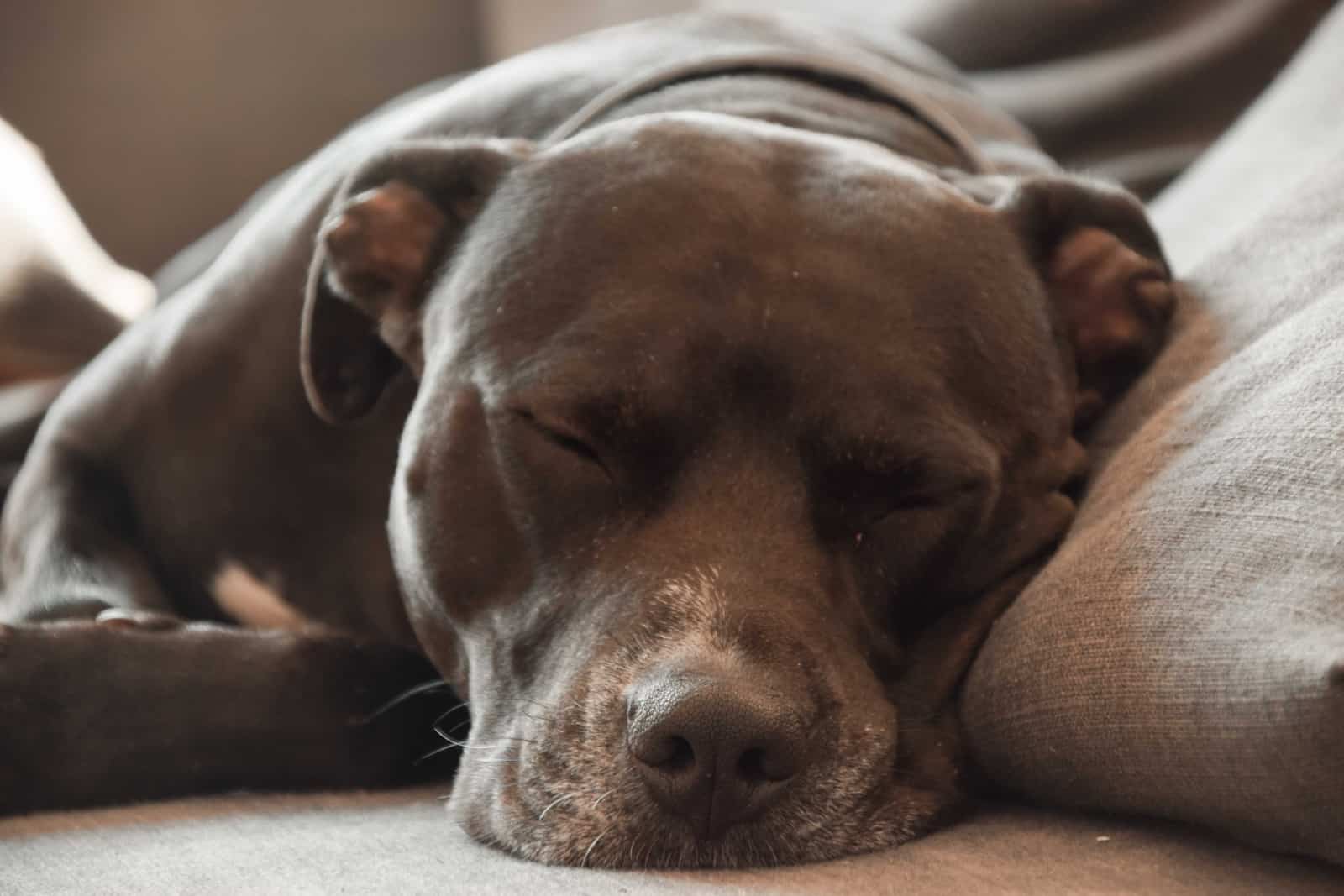
If you keep wondering ‘‘Why does my Pitbull sleep so much,’’ you may want to take a look into some other odd behaviors in your dog. An underlying health issue sometimes can be the reason why your pet sleeps more than usual.
Alongside excessive sleeping, dogs with certain medical conditions can also display symptoms such as decreased physical activity, loss of appetite, general confusion, fainting or collapsing, dragging their hind legs on the floor, etc.
Health conditions such as narcolepsy, hypothyroidism, stomach torsion, allergy, or even dysplasia can be the reason why your Pit companion sleeps so much more than usual.
8. Force Of Habit
Even though Pit canines are not a lazy dog breed by default, they sometimes can sleep excessively just because they are used to it. Putting some time into a well-prepared daily routine for your dog is serious work, and it requires consistency.
If you get your Pitbull canine used to an occasional nap right after lunch or you encourage a low-key activity for the most part of the day – the chances that your dog will be set in those ways in the long run are pretty high.
Unusual sleeping patterns in dogs don’t necessarily have to imply that your dog is ill. Quite the contrary – it may be a simple force of habit.
However, encouraging sleeping habits in your dog doesn’t do good for your puppy in the long run. It can affect its nervous system, as well as be a trigger for serious health issues, such as obesity and heart disease.
Training your dog to sleep in a dog bed instead of sleeping with you is probably a good idea in this regard. This way, you will decrease the possibility of your dog sleeping any time you sit on the couch or lay in a bed.
9. It Has Entered Its Senior Years
One of the most common answers to ‘‘why does my Pitbull sleep so much’’ is the simple fact that your Pit canine has just entered its senior years. That’s right… older Pits tend to sleep almost as much as puppies.
During their seniorhood, a dog’s health becomes more fragile, while their activity level significantly drops. Hence – lots of sleep!
As the average lifespan for a full-blooded Pit puppy revolves between 10 and 12 years, you can expect your canine to enter its senior years at eight or nine years of age. This is the time when you need to pay attention to its eating habits as well as to its healthcare.
Purchasing the best dog food for your Pit will reduce the possibility of bloat and other gastric problems. On the other hand, giving your dog a respectable amount of exercise during the day (around 30 minutes) will keep its heart healthy.
How Long Does An Average Pitbull Sleep
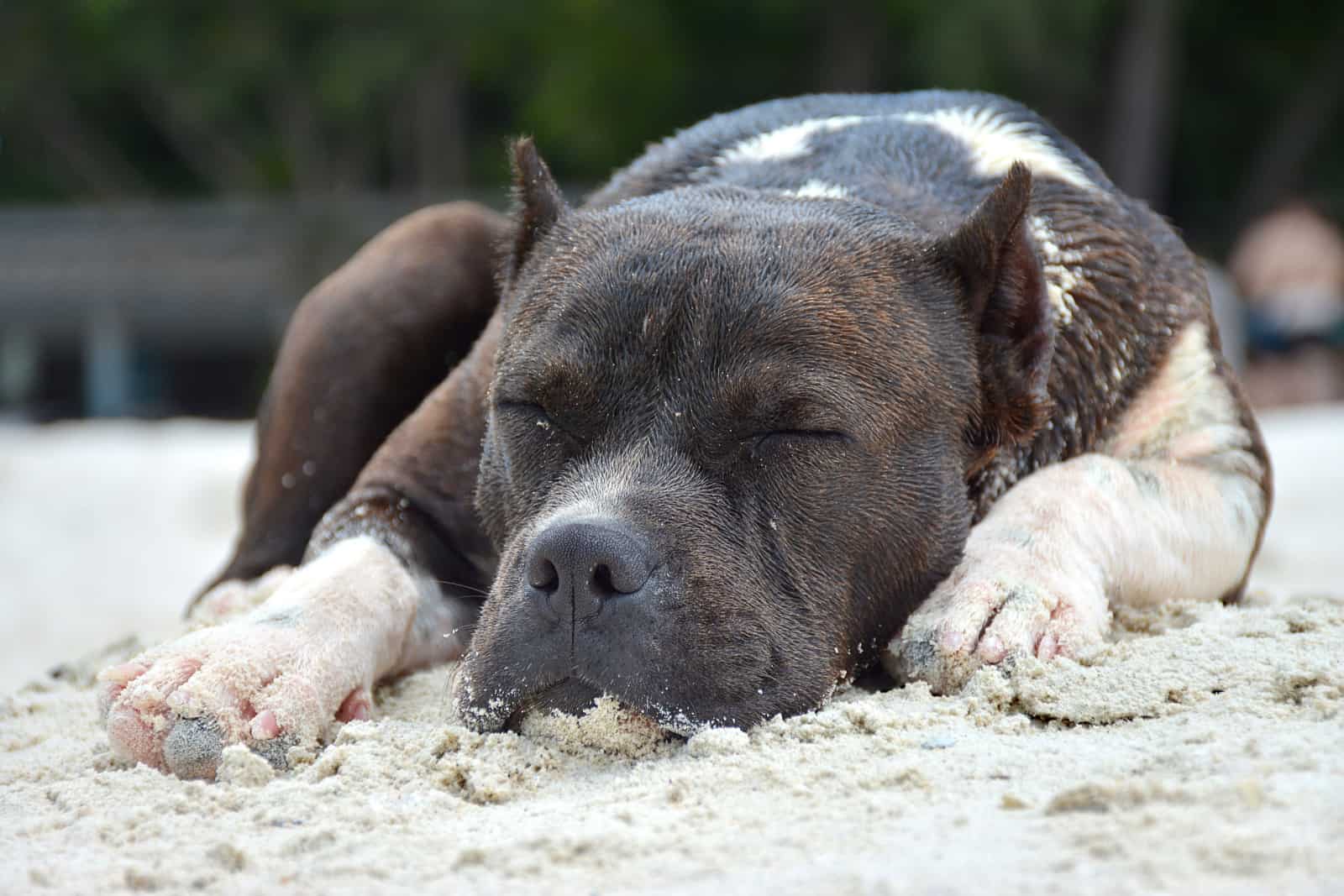
It is normal for Pit canines to sleep anywhere between ten and fourteen hours during the day. That’s right… even though these canines seek a lot of activity during the day – they seek a lot of sleep, too!
That’s why seeing your dog sleeping between your legs on occasion doesn’t have to be a red flag. They just need to take a quick nap, and that’s all!
However, if your dog sleeps much longer than fourteen hours – you may want to pay your vet a visit. Anything more than an average number of sleeping hours can be the symptom of a certain condition.
4 Things To Make Your Pitbull More Active
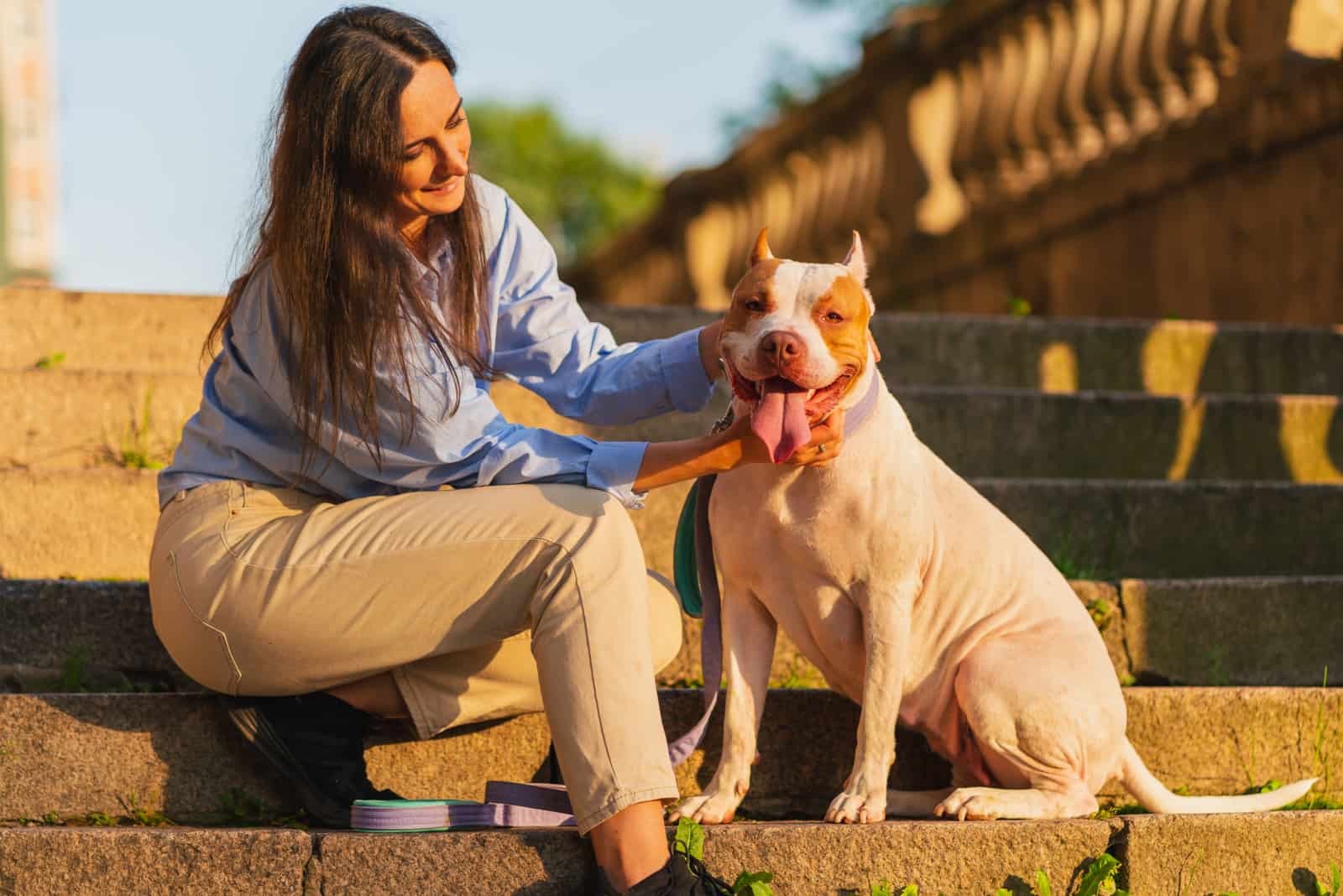
1. Setting Up A Routine
As Pit puppies are not a lap breed of dogs, they will need a much stricter daily routine that some other dogs. That said, you will need to take into account the following things: how much my dog sleeps, how much it eats, and how much exercise it has.
All three of these segments are equally important to a Pit’s daily routine. Dog’s sleep patterns indicate the quality of both its physical and mental health. On the other hand, its feeding habits, as well as its exercise indicate the capacity of a dog to perform its regular activities.
Having a strong, to-the-point daily routine will improve your Pit companion’s sleeping, and reduce the number of lazy hours during the day. Furthermore, puppies that get a proper amount of exercise during the day are more likely to have fewer health issues in the long run.
Lastly, canines with a well-established daily routine are more likely to have less behavioral outbursts as keeping them occupied and purposeful will decrease their potential frustration.
2. Mental Stimulation
These canines are not exactly among the most obedient dog breeds in the world. Unlike GSDs and Golden Retrievers, Pit canines can be overly unpredictable and dangerous, even towards their owner.
However, puppies that undergo the process of early socialization and mental stimulation are highly unlikely to display undesirable behavior. They simply need to be mentally stimulated as they get easily bored.
Boredom in dogs is positively correlated with frustration, which can later result in self-destruction, aggression, laziness, and depression. All these things negatively affect your puppy’s mental health.
Just like Terrier dog breeds, these canines also require a lot of attention and affection from their owner. They naturally burn off a lot of energy, but they can easily turn into lazy couch potatoes if not stimulated enough.
You can always make their training routine more fun with some extra supplements, such as Pitbull chewing toys.
3. Positive Reinforcement
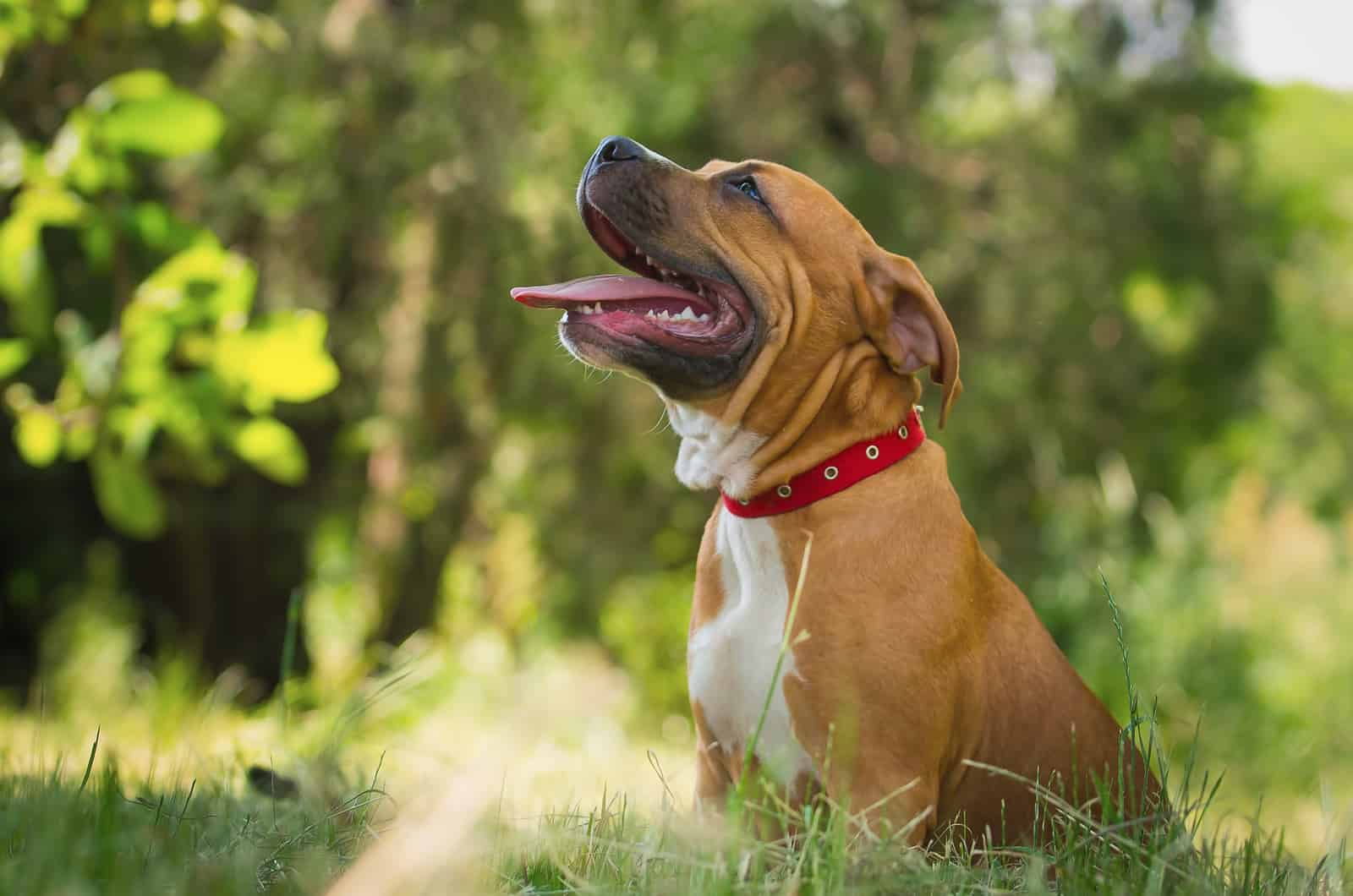
Any respectable Pitbull owner should know that yelling, screaming, or hitting your dog is never an option.
Pit puppies that have suffered severe abuse in their past are more prone to stress, anxiety, and depression. All three of these can be the answer to the ‘‘Why does my Pitbull sleep so much’’ question.
That’s why using positive reinforcement is a much better technique in your dog’s training. The use of healthy snacks or the simple act of petting your dog can be an excellent way to reward your dog.
This way, you will create a much stronger bond with your pet, and additionally, make a more sociable companion out of your Pit.
These puppies happen to respond excellent to positive reinforcement techniques, especially in their young age.
A Pit that went through the process of early socialization and positive reinforcement training during its young age is more likely to be calm, predictable, and more tolerant in the future.
Additionally, positive reinforcement boosts its self-esteem, and makes it more confident among other people and other pets. Hence, a stress-free Pitbull dog!
4. Regular Vet Checkups
Buying a Pit puppy from a reliable kennel is always the better option as you are more likely to get a health-examined, blood-tested, vaccinated, and trained puppy.
Still, due to a Pitbull’s susceptibility to a plethora of health issues, the best thing that you can do for your pet is subject it to regular vet checkups. These are not exactly the healthiest dogs in the world, which is why they need to visit a vet at least once a year.
Subjecting your dog to regular vet exams can prevent the occurrence of some serious issues, such as heart failure and diabetes.
Excessive sleeping in a dog is often correlated with a certain condition, which is why having regular vet checkups is the best way to prevent this undesirable pattern.
FAQs
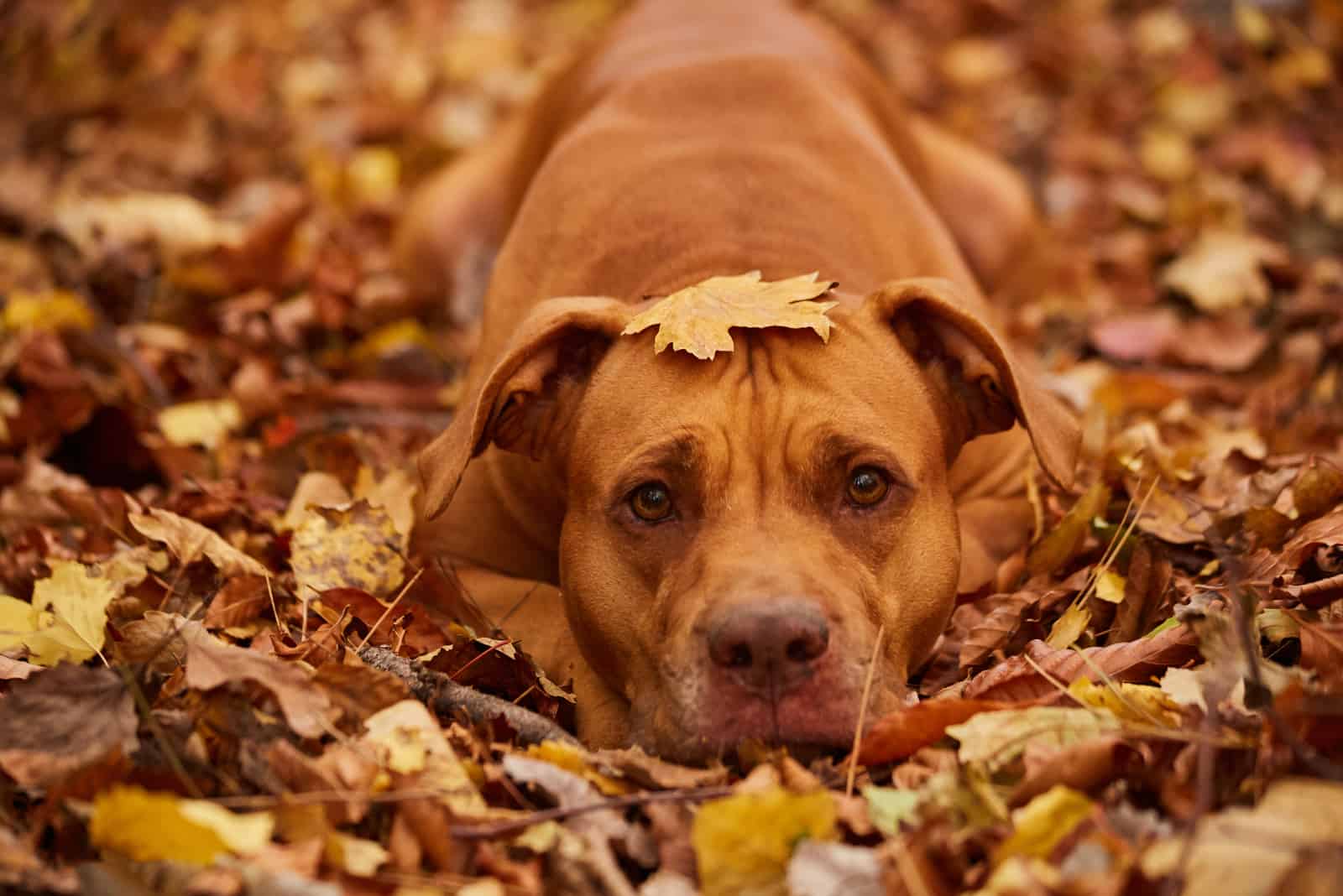
1. Why Is My Pitbull Lazy?
There is more than one root to this phenomenon. A Pit puppy can be lazy due to an inadequately-established daily routine, some serious health problem, or even emotional damage.
These are not exactly low-energy dogs, which is why any sort of lethargic behavior is a cause for reconsidering your parenting methods. If your dog doesn’t get enough exercise during the day – it can become overly lazy.
The same goes for a dog that eats more than it should.
On the other hand, dogs that went through some sort of trauma or injury may display lethargic and lazy behavior.
2. Are Pitbulls Low-Energy Dogs?
Naturally, Pit canines are not low-energy dogs. Even though they might not be as active as shepherd dog breeds, these canines need at least one to two hours of exercise during the day in order to remain mentally healthy and positive.
On the contrary, puppies that don’t receive enough exercise during the day may become overly aggressive and self-destructive. That’s why you should never let a day go by without giving your Pit companion the required amount of exercise.
3. What Is The Difference Between A Pitbull And A Pitbull Mix?
The difference between a full-blooded Pit puppy and its mix is in its bloodline. Naturally, Pit puppies are strong, independent, and affectionate dogs that seek an experienced owner with a flexible schedule.
These canines naturally crave human company and engagement, and they can be seriously frustrated and anxious if they don’t receive the proper amount of attention.
On the other hand, a Pit mix can resemble a Pit parent breed as long as it has a dominant gene of the Pitbull in its bloodline. However, Pit mixes with a dominant gene of another dog parent may take on that particular parent.
In those circumstances, a dog’s potential behavior depends on its parent breeds.
Summing It Up
The ‘‘Why does my Pitbull sleep so much’’ question is a complex matter that every Pit owner should take seriously. Most of the time, this phenomenon is rooted in the dog’s routine.
That said, any respectable Pitbull owner should take into consideration its puppy’s needs and daily requirements.
If, however, excessive sleeping either derives from a certain health condition or emotional damage – the best way to help your puppy is by subjecting it to professional help.
Getting help from veterinarians and dog behaviorists is always a good option, especially if you lack experience in this regard.
Having a happy Pit puppy by your side is the ultimate goal of any Pit owner. Anything else would not be good.
Read more: Why Does My Dog Scratch My Bed Sheets: 9 Explanations


